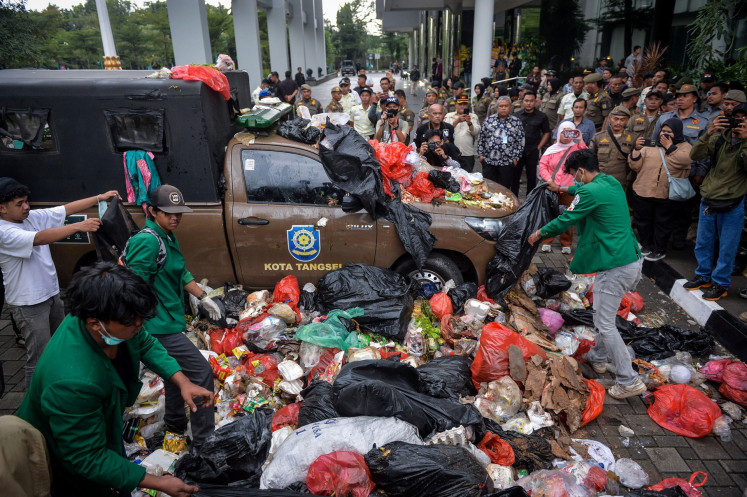Popular Reads
Top Results
Can't find what you're looking for?
View all search resultsPopular Reads
Top Results
Can't find what you're looking for?
View all search resultsThe cost of life
Change text size
Gift Premium Articles
to Anyone
T
housands of cancer patients are in urgent need of an explanation: Should they stop their therapy as they have been told their medication will no longer be covered by the national health insurance (JKN) scheme? How will they cover the costs?
The government said the coverage of two drugs for colorectal cancer was not “cost effective”, meaning the drugs don’t save enough lives for their high price tags. This is to reduce the JKN’s perpetual deficit.
Five years after the JKN was launched, the scheme is running at an annual deficit expected to surpass Rp 10 trillion (US$710.69 million), almost a third of which is spent on treating cancer patients, who are among the main claimants in the JKN.
This is why the government announced recently that bevacizumab and cetuximab would be dropped from the latest national formulary on March 1. Colorectal cancer is the country’s fourth-most common cancer after breast, cervical and lung cancer.
However, assessing the value of life is always morally challenging.
Unlike toll roads and airports, the value of a human life cannot be subject to a cost-benefit analysis. And when the government says it refuses to cover the drugs because it lacks the money, why not reduce spending on roads and airports to solve the insurance deficit?
There is no doubt that the government needs to control insurance expenditure. That’s something that even more established insurance schemes in developed countries don’t do.
What is urgently needed now is for the government to elaborate on the reasoning behind the cuts that will affect thousands of patients and their families.
The government has referred to a study called the Health Technology Assessment in justifying its decision to end coverage for the two cancer cures. However, the Health Ministry and the insurance’s operator, the Health Care and Social Security Agency (BPJS Kesehatan) have yet to reveal just how much less effective alternative drugs are or how many lives would be affected, let alone inform patients.
The government also has yet to explain how patients should deal with the new situation. Will there be help for them to adjust before the government ends coverage for the medicines? What are the alternatives?
These basic questions should have been addressed to prevent any crisis before a medicine or treatment is taken off the list of covered medicines.
The government should learn from last year’s delisting of trastuzumab, a breast cancer medicine, which the BPJS Kesehatan was forced to put back on the list following a lawsuit filed by a cancer patient.
The insurance scheme is clearly in need of fixing, but the drastic measures should be handled with care to prevent public outrage caused by the sudden disruption of healthcare services for patients who face increasing risks to their lives.










